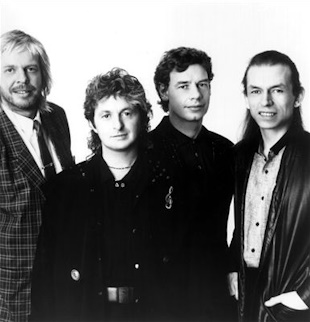Anderson Bruford Wakeman Howe
| Anderson Bruford Wakeman Howe | |
|---|---|

|
|
| Background information | |
| Origin | England, United Kingdom |
| Genres | Progressive rock, art rock |
| Years active | 1988–1990 |
| Labels |
Arista Fragile Herald/Caroline (US) Tring International (EEC) Voiceprint |
| Associated acts | Yes, King Crimson, Anderson, Rabin and Wakeman |
| Past members |
Jon Anderson Bill Bruford Rick Wakeman Steve Howe |
Anderson Bruford Wakeman Howe were a progressive rock band active from 1988 to 1990 that comprised four past members of the English progressive rock band Yes. Singer Jon Anderson left Yes as he felt increasingly constrained by their commercial and pop-oriented direction in the 1980s. He began an album with one of the band's line-ups from the 1970s with guitarist Steve Howe, keyboardist Rick Wakeman, and drummer Bill Bruford, who invited Tony Levin to play bass.
The group released their sole studio album, Anderson Bruford Wakeman Howe, in June 1989 which reached number 14 in the UK and number 30 in the US. Their 1989–90 world tour was well-received and spawned two live albums, An Evening of Yes Music Plus (1993) and Live at the NEC – Oct 24th 1989 (2012). In 1990, tracks for a second studio album were included with songs recorded by Yes to make the thirteenth Yes album, Union (1991). This marked the end of Anderson Bruford Wakeman Howe and the start of the eight-member Yes formation until 1992, comprising Anderson Bruford Wakeman Howe and Yes musicians Chris Squire, Trevor Rabin, Tony Kaye, and Alan White.
In 1983, singer Jon Anderson returned to Yes to record lead vocals on their 1983 studio album 90125, which saw Yes adopt a musical direction that was more commercial and pop-oriented. The line-up during this time included bassist Chris Squire, drummer Alan White, keyboardist Tony Kaye, and guitarist Trevor Rabin who wrote the majority of 90125. The release of 90125 saw Yes reach their greatest commercial success which was followed by their 1987 album Big Generator.
...
Wikipedia
